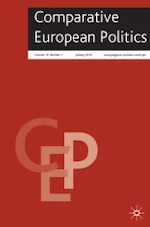 | Conceptions of democracy in the European Parliament: a qualitative analysis of mainstream political groups speeches in rule of law debates By Ramona Coman |
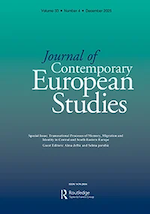 | Intra-institutional memory activism: a sociological investigation of the European Parliament’s politics of remembrance By Andrea Apollonio |
 | Multi-club networks in women’s soccer: reproducing hierarchies under the promise of integration By Jean-Michel De Waele & Jonathan Ferreira |
 | PhD Review: Crafting campaigns, messages, and identities: Belgian parties in a digitalised political arena By Emilie van Haute |
 | PhD Summary: Crafting campaigns, messages, and identities: Belgian parties in a digitalized political arena By Lucas Kins |
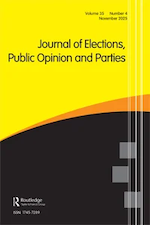 | The impact of party-voter congruence on affective polarization: evidence from Belgium By Bjarn Eck, Elie Michel, Emilie van Haute |
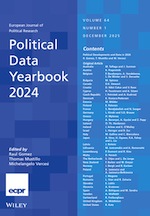 | Belgium: Political Developments and Data in 2024 By Audrey Vandeleene, Pierre Baudewyns, Lieven De Winter, Serge Deruette |
 | Journalism Innovation Under Autocratization: Comparing Journalistic Resistance in Poland and Slovakia By Simone Benazzo |
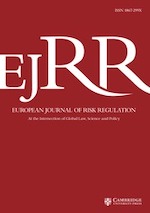 | Rule of Law Protection through RRF Performance-based Spending Conditionality: Lessons from the Polish, Hungarian and Slovak Plans By Pauline Thinus |
 | The wellness pipeline: Tracing far-right health narratives on X By Piotr Marczyński and Catherine Tebaldi |
 | Why Do Politicians Overestimate Richer Voters' Opinions? Social Background and Interest Group Influence By Awenig Marié |
 | Allies or Rivals? The Consequences of Ideological Distinctiveness and Social Recognition of Emergent Subgroups Within Social Movements By Pauline Grippa, Paul Bertin, Olivier Klein, Laurent Licata |
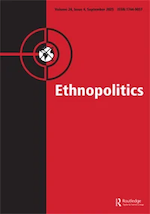 | An Anthropology of Loss: Exploring the Spectral Maps of the Displaced Armenians from Hadrut, Nagorno-Karabakh By Anita Khachaturova |
 | Citizenwashing EU Tech Policy: EU Deliberative Mini‐Publics on Virtual Worlds and Artificial Intelligence By Alvaro Oleart, Perle Petit |
 | As you wish? Public preferences for models of representation and MPs’ role orientations By Nathalie Brack, Philippe Mongrain & Nino Junius |
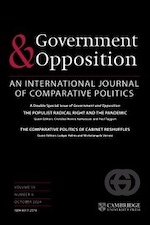 | Transcending the National: QCA Insights into Multilevel Party Organization in the EU By Audrey Vandeleene and Gilles Pittoors |
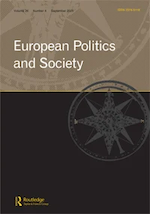 | Varieties of dissensus over liberal democracy in the EU. National and transnational actors By Nathalie Brack, Ramona Coman & Sergiu Miscoiu |
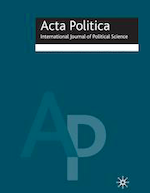 | Acts of dissent in the global crisis of democracy: a typology of opposition, contestation and resistance By Leonardo Puleo & Ramona Coman |
 | Taking democracy's temperature: The (in)stability and covariates of populist attitudes By Marie-Isabel Theuwis |
 | Dissensus over liberal democracy in Europe: how does it shape policies and polity? By Nathalie Brack & Ramona Coman |
 | Dissensus over liberal democracy: concept-building and typology By Nathalie Brack & Ramona Coman |
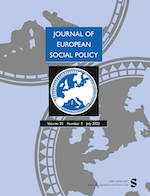 | The EU compromise machine and the politicisation of social policy: Lessons from the regulation of platform work By Amandine Crespy, Bastian Kenn, Slavina Spasova and Matteo Marenco |
 | Beyond market vs. social citizenship: Economic imperatives and the building of a pan-European labour market By Amandine Crespy, Stephen Gaffney and Viola Shahini |
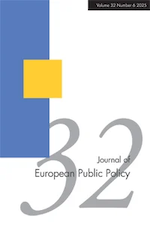 | The asymmetry of EU socio-economic governance: theoretical fault lines and constructivist avenues for future research By Amandine Crespy |
 | ‘We Are No Longer the First to Lead the Dance’: Analysing Intergroup Conflicts Within the French-Speaking Belgian Feminist Movement By Pauline Grippa and Laurent Licata |
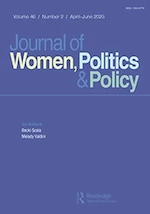 | Beyond Elections: Unpacking the Gender Gap in Political Ambition Across Political Roles By Bram Wauters, Robin Devroe, Audrey Vandeleene & Hilde Coffé |
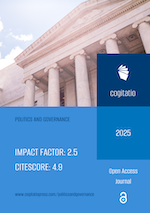 | Far‐Right Illiberalism in the European Parliament By Nathalie Brack in collaboration with Larissa Böckmann, Sarah L. de Lange, and Matthijs Rooduijn |
 | Defending the Status Quo or Seeking Change? Electoral Outcomes, Affective Polarization, and Support for Referendums By Bjarn Eck and Emilien Paulis |
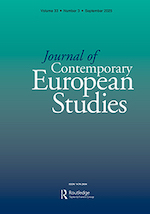 | European political narratives in higher education: towards an ever-stronger politicisation? By François Foret & Anemona Constantin |
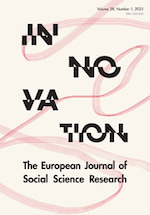 | The flip side of digital technologies in internal party elections: a cybersecurity dilemma? By Emilien Paulis, Lucas Kins, Oscar Barberà & Davide Vittori |
 | “What’s Going On?” Comparing and Contrasting Issue Affinities and Dissimilarities in the European Electorates By Davide Vittori, Aldo Paparo |
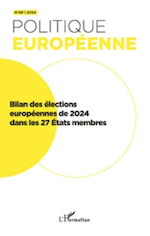 | Les élections européennes en Belgique Un scrutin de troisième ordre Par Nathalie Brack, Samuel Defacqz, Thomas Laloux et Virginie Van Ingelgom |
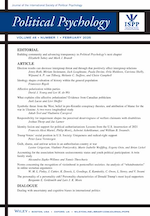 | Psychological insights on the fans' boycott of the 2022 FIFA World Cup By Pauline Grippa, Paul Bertin |
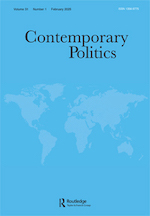 | First survive, then thrive: major urban centres and resistance against autocratisation By Luca Tomini, Giulia Sandri, Adam Szymański |
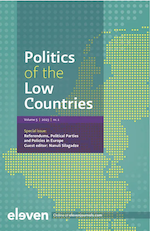 | From Divergence to Convergence: Degrees of Formality in the Connections Between Two Flemish Progressive Political Parties and Organised Civil Society By Nick Martin |
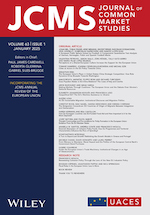 | The Colonial Imaginary of ‘Europe’ in the EU's Asymmetrical Response to the Russian and Israeli Aggressions: Ukraine as a Member of the ‘Family’ Whilst ‘Othering’ Palestine By Alvaro Oleart, Juan Roch |
 | Towards a Polarised Electorate? How Polarisation Affects Turnout Decisions in the Belgian Context of Compulsory Voting By Bjarn Eck and Elie Michel |
 | Introduction By Jean-Michel De Waele & Luiz Guilherme Burlamaqui |
 | Are poor people poorly heard? By Julie Sevenans, Awenig Marié, Christian Breunig, Stefaan Walgrave, Karolin Soontjens, Rens Vliegenthart |
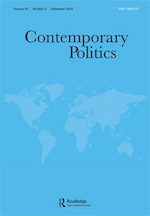 | Local democratic resistance to autocratisation: evidence from Budapest, Banja Luka, and Zagreb By Guido Panzano, Simone Benazzo & Venelin Bochev |
 | To rule or not to rule? An experimental study of the electoral ramifications of claims to (not) rule with radical right populist parties By Laura Jacobs & Jean-Benoit Pilet |
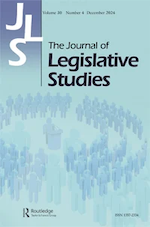 | Unity in adversity: has the grand coalition survived fragmentation and COVID-19 in the 9th European Parliament? By Nathalie Brack, Awenig Marié et Olivier Costa |
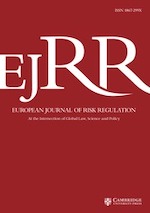 | EU Regulatory Polity 3.0 for Compliance with the Rule of Law: When Depoliticising Goals Lead to Uneven Politicisation By Ramona Coman and Leonardo Puleo |
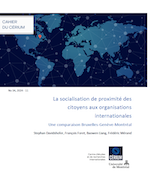 | La socialisation de proximité des citoyens aux organisations internationales : Une comparaison Bruxelles-Genève-Montréal Par François Foret en collaboration avec Stephan Davidshoger, Baowen Liang, et Frédéric Mérand |
 | Politicians’ Theories of Voting Behavior By Nathalie Brack and Jean-Benoit Pilet in collaboration with Jack Lucas, Lior Sheffer, and other colleagues |
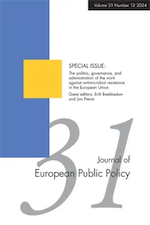 | Far-right contentious politics in times of crisis: between adaptation and transformation By Pietro Castelli Gattinara, Andrea L. P. Pirro and Caterina Froio |
 | The Far Right Out of Its Comfort Zone? Framing Opposition to Immigration during COVID-19 in Italy By Pietro Castelli Gattinara and Raffaele Bazurli |
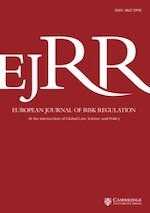 | EU Regulatory Polity 3.0 for Compliance with the Rule of Law: When Depoliticising Goals Lead to Uneven Politicisation By Ramona Coman and Leonardo Puleo |
 | As you wish? Public preferences for models of representation and MPs’ role orientations By Nathalie Brack in collaboration with Philippe Mongrain and Nino Junius |
 | Between Decline and Distress Innovations: The Transformation of the Belgian French-Speaking Christian-democratic Party (cdH) By Sacha Rangoni in collaboration with Thomas Legein |
 | Opposition and resistance: how judges and professional associations in Poland, Hungary, and Romania defend their independence By Ramona Coman with Leonardo Puleo |
 | Resilient austerity? National economic discourses before the pandemic in the European Union By Tiago Moreira Ramalho, Tom Massart and Amandine Crespy |
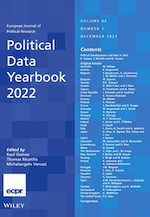 | Belgium: Political Developments and Data in 2023 By Audrey Vandeleene co-authored with Pierre Baudewyns, Lieven De Winter, and Serge Deruette |
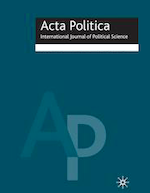 | Favoring ingroups, derogating from outgroups: how populist parties in Belgium polarize on social media By Lucas Kins, Laura Jacobs and Caroline Close |
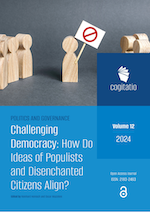 | The Preferred Governing Actors of Populist Supporters: Survey Evidence From Eight European Countries By Jean-Benoit Pilet, Davide Vittori, Emilien Paulis, Sebastien Rojon |
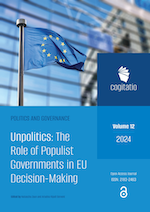 | Backsliding Populist Governments in the Council: The Case of the Hungarian Fidesz By Ramona Coman |
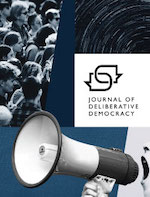 | Fair Enough? Mini-Public Composition and Outcome Acceptance from the Maxi Public By Emilien Paulis, Jean-Benoit Pilet, Sébastien Rojon and Davide Vittori |
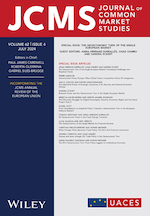 | The European Union's Response to the Rule of Law Crisis and the Making of the New Conditionality Regime By Ramona Coman |
 | From fringe to front? Assessing the voting influence of the radical right in the European Parliament By Nathalie Brack and Awenig Marié |
 | Resilient austerity? National economic discourses before the pandemic in the European Union By Tiago Moreira Ramalho, Tom Massart, Amandine Crespy |
 | How does the EU seek to encourage change in national justice systems? A framework of coordinative and coercive Europeanization at work By Ramona Coman |
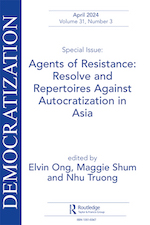 | Alternative patterns to electoral autocracy: recognizing diversity in contemporary autocratization processes By Luca Tomini with Claudio Balderacchi |
 | Comparing political participation profiles in four Western European countries Par Sébastien Rojon, Davide Vittori and Emilien Paulis with Paulina Pankowska |
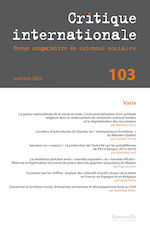 | Contester par les chiffres : analyse des collectifs d’audit citoyen de la dette en France, en Espagne et en Belgique Par Jessy Bailly |
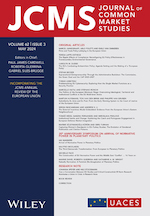 | The EU’s Transactional Approach to Rule of Law Spending Conditionality in the 2020s Par Pauline Thinus |
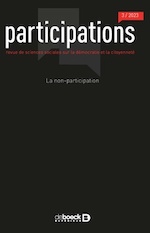 | L’imaginaire démocratique des élu·es et des gouvernant·es à l’épreuve d’une citoyenneté politique augmentée Par Jessy Bailly |
 | Distinction within the ‘global north’? A Bourdieusian approach for analysing development discourse: The case of U.S. and E.U. relations with the Colombian state (2016–2022): A comparative analysis By Hugo Corten |
 | During the past few decades, Latin American governments’ recurrent attacks against journalists have contributed to the erosion of press freedom in the region and, relatedly, of the quality of democracy. Yet what pushes governments to harass journalists? W By Jean-Benoit Pilet, Camille Bedock, David Talukder & Sacha Rangoni |
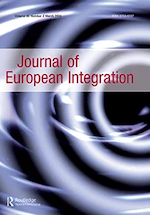 | Embedding past, present and future crises: time and the political construction of the Covid-19 pandemic in the EU By Amandine Crespy, Tom Massart, Tiago Moreira Ramalho |
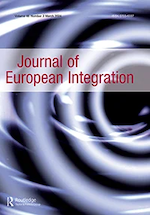 | How ‘European sovereignty’ became mainstream: the geopoliticisation of the EU’s ’sovereign turn’ by pro-EU executive actors By Alvaro Oleart and Juan Roch |
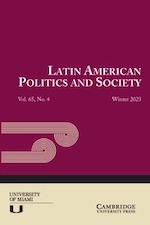 | Shut Up! Governments’ Popular Support and Journalist Harassment: Evidence from Latin America By Luca Tomini, Andrea Cassani, Claudio Balderacchi |
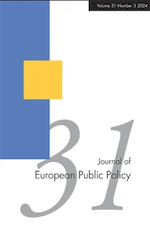 | Beyond ‘responsibility vs. responsiveness’: reconfigurations of EU economic governance in response to crises By Amandine Crespy, Tiago Moreira Ramalho and Vivien Schmidt |
 | Kicking off passion: the birth and rise of football in Belgium (1880-1914) Par Pascal Delwit |
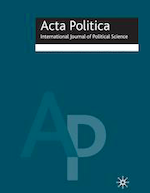 | National or partisan representation: do politicians’ perceptions of the opinions of these voter groups depend on party characteristics? Par Awenig Marié |
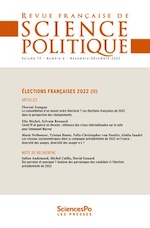 | COVID-19 et guerre en Ukraine Influence des crises internationales sur le vote pour Emmanuel Macron Par Elie Michel avec Sylvain Brouard |
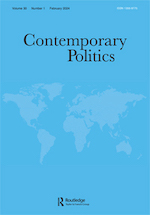 | Big ideas, little detail: how populist parties talk about referendums in Europe By Jean-Benoit Pilet with Sergiu Gherghina and Bettina Mitru |
 | The angry voter? The role of emotions in voting for the radical left and right at the 2019 Belgian elections By Laura Jacobs, Jean-Benoit Pilet & Caroline Close |
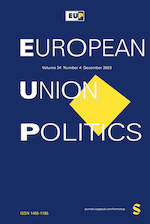 | Unequal perspectives? Income inequality as a benchmark for support for European integration By Bjarn Eck in collaboration with Sven Schreurs |
 | An introduction to ‘Religion in the European Parliament: between nation and Europe’ By François Foret |
 | Pluralité des corps politiques et représentation symbolique Par François Foret |
 | Contagion From Abroad. How Party Entry in Western Europe is Influenced by Party Family Members Abroad, 1961–2016 By Jean-Benoit Pilet with Marc van de Wardt, Gijs Schumacher, and Arjen van Witteloostuijn |
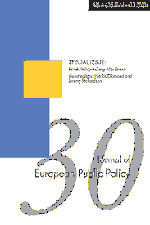 | How the impossible became possible: evolving frames and narratives on responsibility and responsiveness from the Eurocrisis to NextGenerationEU By Amandine Crespy and Tom Massart, with Vivien Schmidt |
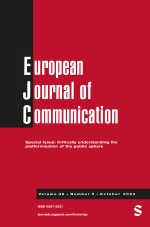 | SLAPPs against journalists in Europe: Exploring the role of self-regulatory bodies By Simone Benazzo with Marie Fierens and Florence Le Cam |
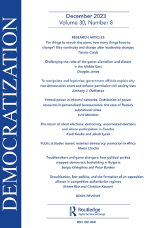 | "Explaining judges" opposition when judicial independence is undermined: insights from Poland, Romania, and Hungary By Leonardo Puleo and Ramona Coman |
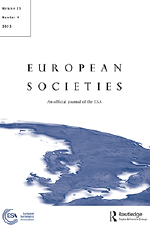 | A digital principal? Substantive representation in the case of the Italian Five Star Movement By Davide Vittori with Lorenzo Mosca |
 | Business as usual? How gamification transforms internal party democracy By Davide Vittori and Cecilia Biancalana |
 | Challenging assumptions: investigating measurement sensitivity in substantive representation and its effects on policy satisfaction By David Talukder |
 | Dealing with a violent past and its remnants in the present: the challenges of remembering the wars in Chechnya in the Chechen Diaspora in the EU By Aude Merlin with Anne Le Huérou |
 | Decolonising EU Trade Relations with the Global Souths? By Camille Nessel with Antonio Salvador M. Alcazar III & Jan Orbie |
 | Do Politicians Outside the United States Also Think Voters Are More Conservative than They Really Are? By Jean-Benoit Pilet in collaboration with Lior Sheffer, Luzia Helfer, Frédéric Varone, Rens Vliegenthart and Stefaan Walgrave |
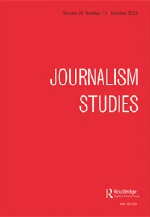 | Gatekeeping, News Values and Selection: Factors Determining the Newsworthiness of Hate Crimes By Laura Jacobs with Joost van Spanje |
 | Gender Gaps in Political Ambition on Different Levels of Policy-Making By Audrey Vandeleene in collaboration with Robin Devroe, Hilde Coffé and Bram Wauters |
 | Les déclassés: un appât pour les extrêmes? By Caroline Close |
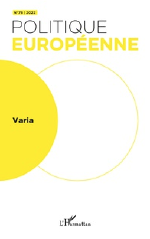 | Les secrétariats politiques. Des acteurs discrets et discrétionnaires dans le travail politique du Comité des régions By Jessy Bailly |
 | Podemos and Syriza, the End of an Era? By Tiago Moreira Ramalho |
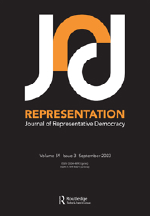 | Political Parties Abroad. A New Arena for Electoral Politics By Emilie Van Haute & Tudi Kernalegenn |
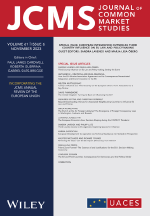 | Regulating Disinformation and Big Tech in the EU: A Research Agenda on the Institutional Strategies, Public Spheres and Analytical Challenges By Alvaro Oleart with Luis Bouza García |
 | Time to go: Paths of term limit resilience in sub-Saharan Africa By Luca Tomini with Andrea Cassani |
 | Understanding how bundles of party reforms are shaped: A snowballing sequence in the French-speaking Belgian liberal party (MR) By Thomas Legein |
 | A regional perspective to the study of affective polarization By Luca Bettarelli & Emilie van Haute, with Andres Reiljan |
 | Can Democratic Innovations Reconcile Citizens with Representative Institutions? By Pierre-Etienne Vandamme |
 | Démocratiser le lien représentatif: une sociologie politique des citoyen·nes-contrôleur·euses By Jessy Bailly |
 | Die Verantwortung der Europäischen Union in der Welt – eine deutsch-nordisch-baltische Perspektive By Serafine Dinkel |
 | Great minds think alike? Ideological congruence between party members and leadership candidates By Audrey Vandeleene with Pieter Moens & Bram Wauters |
 | It’s not only about the leader. Oligarchized personalization and preference voting in Belgium By Jessy Bailly |
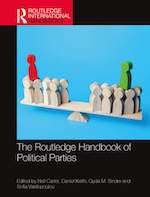 | Liberal parties By Caroline Close and Thomas Legein |
 | Lost in transition? Social justice and the politics of the EU green transition By Amandine Crespy with Mario Munda |
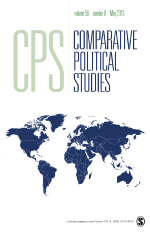 | When the Far Right Makes the News: Protest Characteristics and Media Coverage of Far-Right Mobilization in Europe By Pietro Castelli Gattinara with Caterina Froio |
 | Where you live explains how much you trust local (and national) institutions: A study of the Italian case By Davide Vittori |
